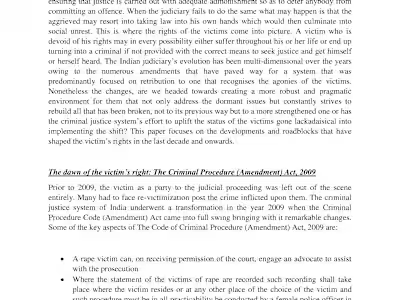“HUMAN RIGHTS & CRIMINAL JUSTICE SYSTEM IN CONTEMPORARY WORLD”
ABSTRACT
A person by birth carries with him certain entitlements which form the essence of
what the life of a human is. Anything that de-humanizes a human being is a
menace to its entire race and tarnishes the ideal picture of the society that
has since its existence strived towards building nothing less than a utopia for
its citizens. Every crime leaves behind a great deal of wreckage and the victim
has to come to grips with the unforeseen financial, physical and psychological
load that weighs down heavily on his conscience thereby making survival an
incessant struggle. Despite having provisions imbibed in the Indian
Constitution to protect those whose rights have been transgressed, not a single
day goes by where we don’t witness crime of one kind or the other. Human rights
have received global recognition in the past few decades. Of late in India,
issues pertaining to breach of human rights have surfaced owing to the
ever-expanding digital age, be it the restrictions that are placed on an
individual’s basic right such as the freedom of speech and expression or
infringement on their right to privacy or lack of victim-friendly provisions
within the Indian Judicial System. Similarly, when a predominantly punitive
judicial system that is focused primarily upon the offender, is unmindful of
the victims’ right, it deprives him or her of any means to live justly and
fairly. This research paper touches upon myriads of issues prevalent under the
Indian Jurisprudence including the existing provisions that advocates for human
rights of the victims while throwing light into the harrowing gap between the
objectives that are aimed at and a vague reality at the same time mapping out
ways to reach the victim centric goals that are distant yet achievable.
I.
The Inception: Birth of the rights and the Rights by
birth
A significant effect on the Indian constitution came along the time when
the United Nations General Assembly adopted the Universal
Declaration of Human Rights, 1948 and called upon all member states to
adopt these rights in their respective constitutions. The principles contained
in the declaration brought human rights into the domain of International law.
As a consequence, the fundamental rights were incorporated in the constitution.
Human right laws in India derive their power from the Universal Declaration of
Human Rights which is the global substratum for the rights of humanity.
The Protection of Human Rights Act, 1993 was
enacted with the main objective to
guard the human rights, to constitute and establish the Human Rights Protection
Commission. The Act defines ‘Human Rights’ as the “rights that relate with life, liberty, equality and dignity of the
Like this project
Posted May 24, 2023
A research paper on Human Rights.
Likes
0
Views
2





